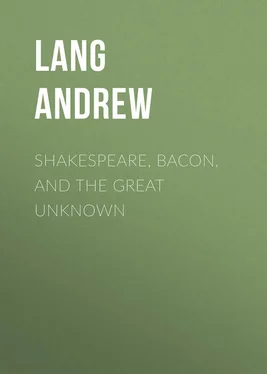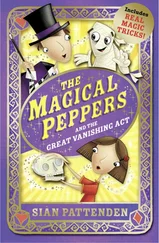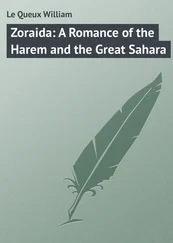Andrew Lang - Shakespeare, Bacon, and the Great Unknown
Здесь есть возможность читать онлайн «Andrew Lang - Shakespeare, Bacon, and the Great Unknown» — ознакомительный отрывок электронной книги совершенно бесплатно, а после прочтения отрывка купить полную версию. В некоторых случаях можно слушать аудио, скачать через торрент в формате fb2 и присутствует краткое содержание. Жанр: foreign_antique, foreign_prose, на английском языке. Описание произведения, (предисловие) а так же отзывы посетителей доступны на портале библиотеки ЛибКат.
- Название:Shakespeare, Bacon, and the Great Unknown
- Автор:
- Жанр:
- Год:неизвестен
- ISBN:нет данных
- Рейтинг книги:4 / 5. Голосов: 1
-
Избранное:Добавить в избранное
- Отзывы:
-
Ваша оценка:
- 80
- 1
- 2
- 3
- 4
- 5
Shakespeare, Bacon, and the Great Unknown: краткое содержание, описание и аннотация
Предлагаем к чтению аннотацию, описание, краткое содержание или предисловие (зависит от того, что написал сам автор книги «Shakespeare, Bacon, and the Great Unknown»). Если вы не нашли необходимую информацию о книге — напишите в комментариях, мы постараемся отыскать её.
Shakespeare, Bacon, and the Great Unknown — читать онлайн ознакомительный отрывок
Ниже представлен текст книги, разбитый по страницам. Система сохранения места последней прочитанной страницы, позволяет с удобством читать онлайн бесплатно книгу «Shakespeare, Bacon, and the Great Unknown», без необходимости каждый раз заново искать на чём Вы остановились. Поставьте закладку, и сможете в любой момент перейти на страницу, на которой закончили чтение.
Интервал:
Закладка:
Had I to maintain the Baconian hypothesis, I would not weigh heavily on bookless Will’s rusticity and patois. Accepting Ben Jonson’s account of his “excellent phantasy, brave notions, and gentle expressions, wherein he flowed with that facility.. ,” accepting the tradition of his lively wit; admitting that he had some Latin and literature, I would find in him a sufficiently plausible mask for that immense Unknown with a strange taste for furbishing up older plays. I would merely deny to Will his genius , and hand that over to Bacon – or Bungay. Believe me, Mr. Greenwood, this is your easiest way! – perhaps this is your way? – the plot of the unscrupulous Will, and of your astute Bungay, might thus more conceivably escape detection from the pack of envious playwrights.
According to “all tradition,” says Mr. Greenwood, Shakespeare was taken from school at the age of thirteen. Those late long-descended traditions of Shakespeare’s youth are of little value as evidence; but, if it pleases Mr. Greenwood, I will, for the sake of argument, accept the whole of them. Assuredly I shall not arbitrarily choose among the traditions: all depends on the genealogical steps by which they reach us, as far as these can be discovered. 48 48 See chapter X, The Traditional Shakespeare .
According to the tattle of Aubrey the antiquary, publishing in 1680, an opinion concerning Shakspere’s education reached him. It came thus; there had been an actor in Shakspere’s company, one Phillips, who, dying in 1605, left to Shakspere the usual thirty-shilling piece of gold; and the same “to my servant, Christopher Beeston.” Christopher’s son, William, in 1640, became deputy to Davenant in the management of “the King’s and Queen’s Young Company”, and through Beeston, according to Aubrey, Davenant learned; through Beeston Aubrey learned, that Shakespeare “understood Latin pretty well, for he had been in his younger days a school-master in the country.” Aubrey writes that “old Mr. Beeston, whom Mr. Dryden calls ‘the chronicle of the stage,’” died in 1682. 49 49 See C. I. Elton, William Shakespeare , His Family and Friends , pp. 48, 343–8.
This is a fair example of the genealogy of the traditions. Phillips, a friend of Shakspere, dies in 1605, leaving a servant, Christopher Beeston (he, too, was a versifier), whose son, William, dies in 1682; he is “the chronicle of the stage.” Through him Davenant gets the story, through him Aubrey gets the story, that Shakspere “knew Latin pretty well,” and had been a rural dominie. Mr. Greenwood 50 50 The Shakespeare Problem Restated , pp. 207–9.
devotes much space to disparaging Aubrey (and I do not think him a scientific authority, moult s’en faut ), but Mr. Greenwood here says not a word as to the steps in the descent of the tradition. He frequently repeats himself, thereby forcing me to more iteration than I like. He had already disparaged Aubrey in note I to p. 105, but there he approached so closely to historical method as to say that “Aubrey quotes Beeston, a seventeenth-century actor, as his authority.” On p. 209 he dismisses the anecdote (which does not suit his book) as “a mere myth.” “ He knows, he knows” which traditions are mythical, and which possess a certain historical value.
My own opinion is that Shakspere did “know Latin pretty well,” and was no scholar , as his contemporaries reckoned scholarship. He left school, if tradition speak true, by a year later than the age, twelve, when Bacon went to Cambridge. Will, a clever kind of lad (on my theory), left school at an age when some other clever lads became freshmen. Why not? Gilbert Burnet (of whom you may have heard as Bishop of Salisbury under William III) took his degree at the age of fourteen.
Taking Shakspere as an extremely quick, imaginative boy, with nothing to learn but Latin, and by the readiest road, the colloquial, I conceive him to have discovered that, in Ovid especially, were to be found the most wonderful and delightful stories, and poetry which could not but please his “green unknowing youth.” In the years before he left Stratford, and after he left school (1577–87?), I can easily suppose that he was not always butchering calves, poaching, and making love; and that, if he could get books in no other way, this graceless fellow might be detected on a summer evening, knitting his brows over the stories and jests of the chained Ovid and Plautus on his old schoolroom desk. Moi qui parle , I am no genius; but stories, romance, and humour would certainly have dragged me back to the old desks – if better might not be, and why not Shakspere? Put yourself in his place, if you have ever been a lad, and if, as a lad, you liked to steal away into the world of romance, into fairyland.
If Will wrote the plays, he (and indeed whoever wrote the plays) was a marvel of genius. But I am not here claiming for him genius, but merely stating my opinion that if he were fond of stories and romance, had no English books of poetry and romance, and had acquired as much power of reading Latin as a lively, curious boy could easily gain in four years of exclusively Latin education, he might continue his studies as he pleased, yet be, so far, no prodigy.
I am contemplating Will in the conditions on which the Baconians insist; if they will indeed let us assume that for a few years he was at a Latin school. I credit the graceless loon with the curiosity, the prompt acquisitiveness, the love of poetry and romance, which the author of the plays must have possessed in youth. “Tradition says nothing of all that,” the Baconian answers, and he may now, if he likes, turn to my reply in The Traditional Shakespeare . 51 51 Chapter X, infra.
Meanwhile, how can you expect old clerks and sextons, a century after date, in a place where literature was not of supreme interest, to retain a tradition that Will used to read sometimes (if he did), in circumstances of privacy? As far as I am able to judge, had I been a boy at Stratford school for four years, had been taught nothing but Latin, and had little or no access to English books of poetry and romance, I should have acquired about the same amount of Latin as I suppose Shakspere to have possessed. Yet I could scarcely, like him, have made the second syllable in “Posthumus” long! Sir Walter Scott, however, was guilty of similar false quantities: he and Shakspere were about equally scholarly.
I suppose, then, that Shakspere’s “small Latin” (as Jonson called it) enabled him to read in the works of the Roman clerks; to read sufficient for his uses. As a fact, he made use of English translations, and also of Latin texts. Scholars like Bacon do not use bad translations of easy Latin authors. If Bacon wanted Plutarch, he went to Plutarch in Greek, not to an English translation of a French translation of a Latin translation.
Some works of Shakespeare, the Lucrece , for example, and The Comedy of Errors (if he were not working over an earlier canvas from a more learned hand), and other passages, show knowledge of Latin texts which in his day had not appeared in published translations, or had not been translated at all as far as we know. In my opinion Will had Latin enough to puzzle out the sense of the Latin, never difficult, for himself. He could also “get a construe,” when in London, or help in reading, from a more academic acquaintance: or buy a construe at no high ransom from some poor scholar. No contemporary calls him scholarly; the generation of men who were small boys when he died held him for no scholar. The current English literature of his day was saturated with every kind of classical information; its readers, even if Latinless, knew, or might know a world of lore with which the modern man is seldom acquainted. The ignorant Baconian marvels: the classically educated Baconian who is not familiar with Elizabethan literature is amazed. Really there is nothing worthy of their wonder.
Читать дальшеИнтервал:
Закладка:
Похожие книги на «Shakespeare, Bacon, and the Great Unknown»
Представляем Вашему вниманию похожие книги на «Shakespeare, Bacon, and the Great Unknown» списком для выбора. Мы отобрали схожую по названию и смыслу литературу в надежде предоставить читателям больше вариантов отыскать новые, интересные, ещё непрочитанные произведения.
Обсуждение, отзывы о книге «Shakespeare, Bacon, and the Great Unknown» и просто собственные мнения читателей. Оставьте ваши комментарии, напишите, что Вы думаете о произведении, его смысле или главных героях. Укажите что конкретно понравилось, а что нет, и почему Вы так считаете.












